Bass, particularly the bass guitar, is often overlooked in music. This is because the lower the frequency, the harder it is for our ears to hear it. Simply because it’s harder to hear, most people don’t pay as much attention to it, and therefore the public doesn’t care about it as much (with the exception of hip-hop). Still, bass is one of the most essential elements in music and for a few reasons.
Bass is essential in music as it traditionally provides the rhythmic and harmonic foundations of a musical piece. Without these lower frequencies, a song might come across as tinny, lifeless, or dull. By bridging the gap between rhythm and melody, the bass imparts a sense of completeness.
Low-end frequencies are hard to hear for people who aren’t specifically listening to them, but they have their place in all music. Bass was intended to extend the length of the musical staff, and it allowed for a lot more instruments. It’s crucial to have bass in your song because without it, it just wouldn’t sound right. We’ll explore what a song sounds like without bass later.
Bass is Crucial to Music For More Than One Reason
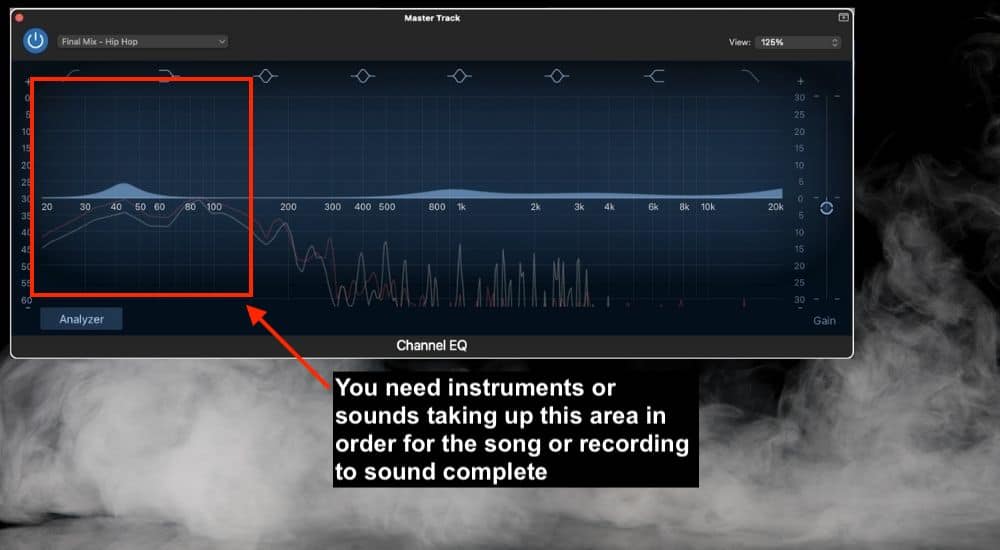
1) The Bass Lays The Foundation of the Song Rhythmically and Harmonically
The importance of bass is difficult to describe with words, but I like to think of it like a house. If you don’t have a foundation, you don’t have a strong enough structure to even build on.
It would be like trying to build a house on top of a bed of popsicle sticks; it just wouldn’t work.
As I’ve said many other times before, the bass and drums work together rhythmically, especially the kick and the bass drum.
These two elements work together to give the song a pulse, a groove, and a rhythm that a person can bob their head along too. You can read about how to add bass to a song with my other article.
And this isn’t unique to rock music either. Hip-hop music, as I briefly mentioned earlier, often has a tight rhythm section with a cohesive bass and kick drum groove. Modern hip-hop music, particularly trap music, is no different.
The kick is often combined with the bass instrument (now called the 808 which is named after the Roland TR-808), and it’s a crucial element of the genre. The TR-808 looks something like this:
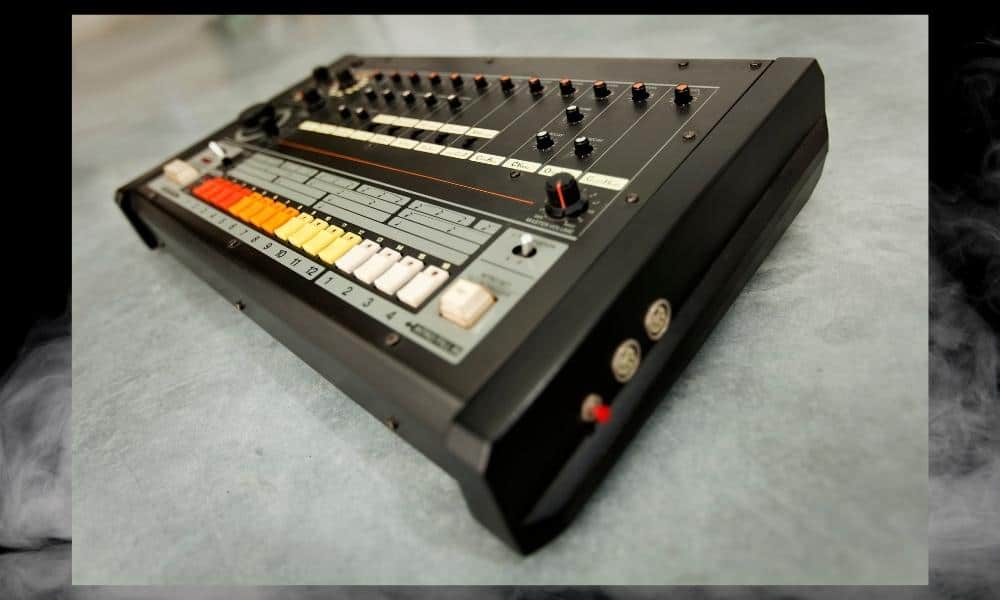
Anybody who’s familiar with the hip-hop production world, knows and understands the importance of the 808 to the music.
If you’ve ever spent any amount of time on Instagram, particularly on the beat-making side of it, you’ll see all kinds of memes about EQing the snare, EQing the kick, and getting the bass and kick drum to work together.
In addition to being used for melodies (my article on that), the bass is crucial because it has the effect of gluing all of the instruments together. A song with a tight rhythm section is definitely a track that’s easy for people to like.
The human ear can also recognize when the lower frequencies fluctuate, making bass even more critical as the glue or foundation.
Without a foundation, the song wouldn’t sound as full and can even easily de-rail. Bass is more often than not, utilized in rhythm, harmony, and melody, making it important and versatile. A bassist has a great responsibility to be present and in time with the pulsing of the music.
They also have a great responsibility to harmonize with the other instruments, The bass note plays a pivotal role in how we hear harmonies because the bass note of a chord represents the key of that chord.
A bass line that simply outlines the root notes of the chord, while it would be very boring and bland, wouldn’t sound terrible either.
2) Bass Works Together With The Rhythm Section to Create Flow and Structure
The rhythm section is comprised of bass and drums, in a typical band, they work together to create a foundation, as mentioned above, for the other instruments. The drums keep the time, and the bass keeps the melodic structure moving for the entire song.
In a live setting, if the bassist loses their place, it can be a train wreck, and the same goes for the drums. They work together to keep everyone on track. If the singer also plays guitar, they are relying on their band to keep them on track too.
That’s when the bass becomes very important in keeping the band glued together. It’s the drummer’s responsibility to provide the pulse of the music, but the bass has the responsibility to carry that pulse alongside the harmonic aspects of the music.
3) Bass Provides Warmth and “Fullness”
Adding warmth to your music is done by boosting the low-end frequencies and cutting higher-end frequencies.
This helps the listener not get ear fatigue, or worse, think the music is annoying. Low-end frequencies can sometimes cut higher frequencies out of the mix if the gain or bass setting is way too high.
What you should be striving for is a delicate balance between the two that compliments the music.
If you are having trouble getting the right warmth and clarity in the bass tone, try setting all your tone knobs on your bass and amplifier to 5 and start turning up the things you want to hear most. Remember that bass adds warmth, and treble adds clarity.
Gain will add some warmth, but it’s there to add more volume and compression mainly. If used right, it can add more warmth as well.
EQ for bass is important here (I have a whole other article article on this on Producer Society). Volume matters, of course, but for warmth and clarity, you’ll want a Bass Roll-Off or Low Pass Filter when recording.
Bass power comes in at about 60hz to 150hz, The higher overtones come in at about 5khz, which is why the human ear focuses mainly on the higher frequencies while the lower ones are felt. Here is a simple rule of thumb for bass frequencies.
80hz to 200hz – to create fullness.
200hz to 500hz – will create muddiness.
500hz to 1khz – creates punchiness in the mix.
1khz – 5khz – will create attack and clarity.
One good way of seeing how particular frequency ranges sound in isolation is to use Fab Filter’s Pro-Q EQ . This is an EQ plugin that allows you to solo a frequency range that way you can hear it on its own and without other frequencies or sounds.
4) Bass Provides Low-End Frequencies That Would Sound Bare Without It
YouTube is a great reference point for this topic. You can listen to many songs that have the bass track entirely omitted for bassists learning to play these songs.
Of course, nothing will ever compare to And Justice For Jason, where a guy added more bass to Metallica’s And Justice For All to give Jason Newsted his rightfully earned volume on that record. Check it at this link here.
In this track from the Gorillaz, a user has removed the bass line that way people can play along to it. If you’re familiar with the original, “Feel Good Inc,” from the same band, you’ll know that the bass line is1 a crucial element of the track.
It’s a big part of what makes it a great song, however, with the bass removed, it hardly sounds the same at all. It lacks a flow and a groove. Compare the bass-less version of it to the original which can be found here.
By listening to both versions of these songs, you can get a good sense of just how important the bass is and how it can be used to make a song sound full and memorable.
It’s important to note also that using bass and not having it at least somewhat audible in the mix will make the music sound a lot more dull to the listener.
Interestingly, as someone who has listened to various kinds of rock and metal music throughout my life, I can probably count on my hand how many records or songs have the bass as a focal part of the music. For the most part, you can’t even hear the bass on albums, and I think that’s really a shame.
5) Bass Provides Reference Points in a Song
All instruments create reference points for other instruments throughout a song. Other than the drums, the bass is the most used instrument for reference points.
Together, the bass and the drums are the back-bone of the track upon which everything else is built. A drummer often introduces the next section of the song with a small fill or stylized pattern.
Often, a singer will match their voice with the bass rather than the guitar because their vocal frequency matches the bass more.
A guitarist needs a great backbone for soloing. When they come out of a solo, and they can’t properly hear the one or the top of the measure, it can be pretty aimless, so they rely on the bassist to hold down the groove.
Reference points in a song are important because they provide a safety net for the live performance.
In a studio, it’s easy to give cues to players, but on stage, each member has to find their own cues and pay attention when they come up, or they will miss important parts of the song.
6) It Makes The Music Sound Complete
The guitar was invented to be more mobile than the Piano. That being said, the bass is an extension of the guitar’s lower frequency range that can often be matched with a big enough piano.
Technically, the bass completes the music just in range, but theoretically, it also completes the sound of the music.
Two-piece bands with only guitars and drums can often be ear-fatiguing due to their lack of lower-end frequencies and warmth that the bass adds. This is why a standard, modern band has some type of low-end instrument like the bass or keyboards.
Why Bass is Often Overlooked
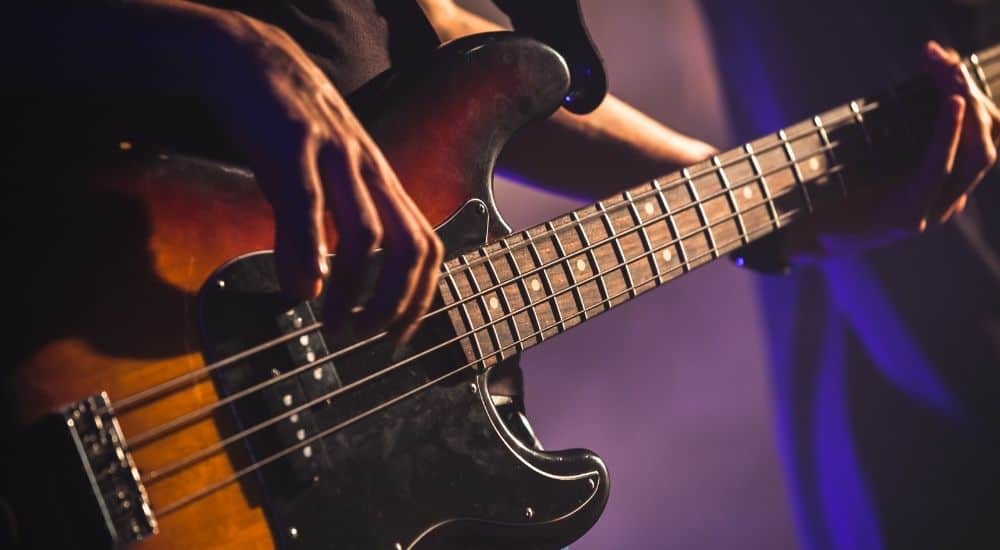
The primary reason why the bass is overlooked in music is because it doesn’t jump out enough to the listener, especially with the way that most popular music has been mixed (with the bass as quiet as possible). Additionally, it just isn’t an instrument that has been at the forefront of the culture.
Let’s talk a little about the bass guitar. The bass guitar is often overlooked because it only has four strings, and to an amateur or someone that has never tried to play it before, it can seem easier to play than a guitar or drums. That couldn’t be further from the truth, though.
Bass has been overshadowed in the past by the guitar and vocals. As a front-stage instrument, it really should get at least as much attention as the guitar, but sadly it doesn’t.
This can be because of a variety of stage issues. The bassist sometimes gets pushed to the back by the drummer to be in the rhythm section.
They also don’t get a bass solo while the guitarist has at least 1 per song, at least in rock and metal music.
Ultimately though, I would say the main reason why the bass doesn’t stand out as much as the guitar is simply because you can’t hear it as much.
The most audible frequencies are between 500Hz and 5000kHz approximately, and the bass tends to be a bit lower than that.
Other Articles You May Be Interested In
- Why Does the Bass Guitar Only Have 4 Strings? [Explained]
- When To Change Your Bass Guitar Strings? [ANSWERED]
- How To Add Bass Guitar To A Song
- Can Bass Guitars Play Melodies?
- Is The Bass Guitar Easier To Play Than Guitar
Important Things to Note About Bass
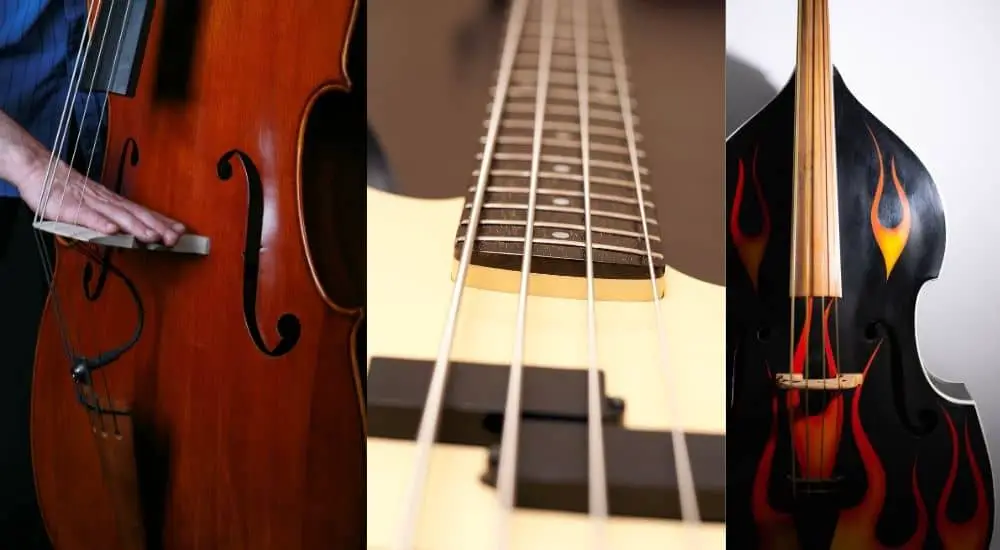
1) Other Instruments Can Act as the Bass Instrument
It isn’t just the bass guitar, double bass, or cello that can serve as the bass instrument in a song (I’ve written about the differences before btw).
In hip-hop music, for example, 808s like what can be found in Initial Audio’s 808 Studio II plugin on Plugin Boutique are a great way to add bass to music. In fact, 808s are becoming a very common part of most pop music.
There was a time when 808s and bass lines were primarily in trap music (a form of hip-hop), but now you can hear them in all kinds of pop, including in Ariana Grande songs.
What I’m trying to say here is that you don’t necessarily need to have a bass guitar to have bass frequencies.
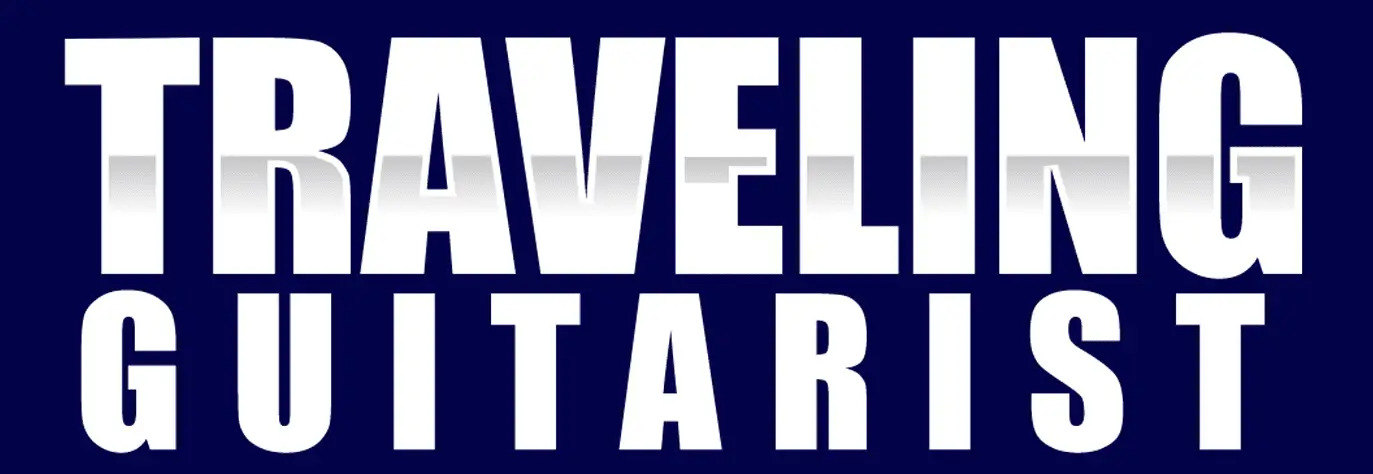
 Written By :
Written By :